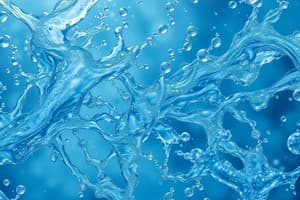Podcast
Questions and Answers
What is the primary biological function of water in the body?
What is the primary biological function of water in the body?
- Providing energy to cells
- Forming structural proteins
- Regulating body temperature (correct)
- Transporting oxygen
Which property of water allows it to dissolve ionic and polar organic compounds?
Which property of water allows it to dissolve ionic and polar organic compounds?
- Polarity (correct)
- Density
- Hydrogen bonding
- Viscosity
Which percentage of the human body is composed of water?
Which percentage of the human body is composed of water?
- 75% (correct)
- 85%
- 65%
- 50%
What is the specific heat of water?
What is the specific heat of water?
What role does hydrogen bonding play in cells?
What role does hydrogen bonding play in cells?
What is the effect of water's high specific heat on homeostasis?
What is the effect of water's high specific heat on homeostasis?
What type of bond exists between water molecules that contributes to its properties?
What type of bond exists between water molecules that contributes to its properties?
Which of the following is NOT a function of water in biological systems?
Which of the following is NOT a function of water in biological systems?
Flashcards are hidden until you start studying
Study Notes
Water
- Water is essential for life and constitutes approximately 75% of the human body.
- Water is a polar molecule due to the electronegativity difference between oxygen and hydrogen atoms, resulting in a partial negative charge on oxygen and partial positive charges on the hydrogen atoms.
- The polar nature of water allows it to form hydrogen bonds with other polar molecules, making it an excellent solvent for ionic compounds and polar organic molecules.
- Water is vital for regulating digestion, transporting nutrients, and excreting waste products.
- Water facilitates the transportation of digested products throughout the body.
- Water serves as the medium for all metabolic reactions within the body due to its ability to dissolve polar molecules.
- Water regulates body temperature through sweating and evaporation, leveraging its high specific heat capacity.
- Water plays a key role in maintaining homeostasis as most cells are composed primarily of water.
- Water contributes to the formation of biological membranes by interacting with various organic compounds.
- Water impacts the structure and function of essential cellular components like DNA and proteins by regulating the folding process through hydrogen bonding.
The Specific Heat of Water
- Water has a high specific heat which means it requires a significant amount of energy to raise or lower its temperature.
- This property makes water resistant to changes in temperature.
The Electronegativity of Oxygen and Hydrogen
- Oxygen is more electronegative than hydrogen.
Studying That Suits You
Use AI to generate personalized quizzes and flashcards to suit your learning preferences.




